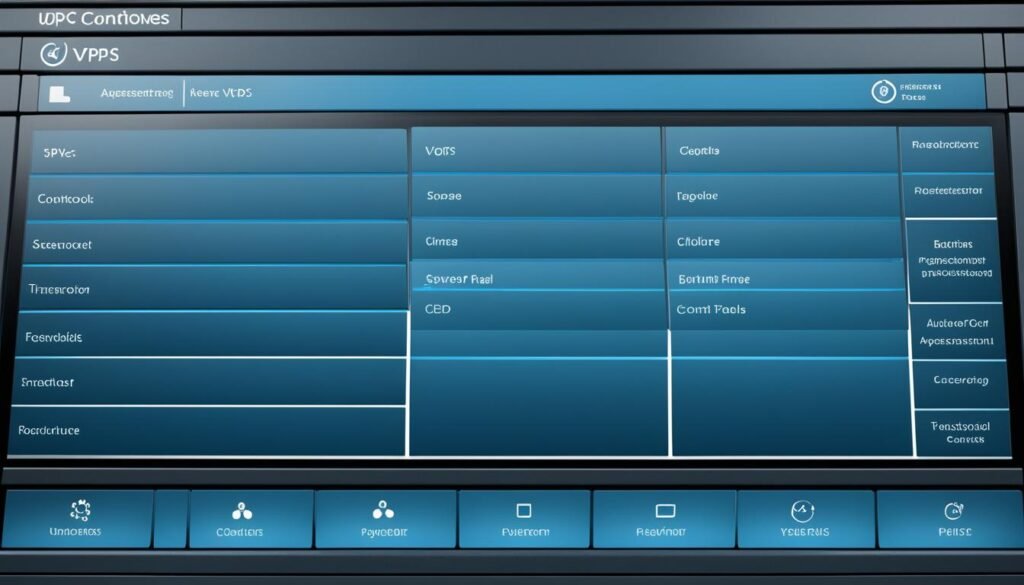Managing your own virtual private server (VPS) can give you the flexibility and control you need for your website. However, it can also be a challenging task that requires the right knowledge and expertise. In this article, we will provide you with valuable tips on managing and maintaining VPS hosting to ensure optimal performance, security, and reliability.
Key Takeaways: Managing And Maintaining VPS Hosting
- Proper VPS management is essential for optimal performance, security, and reliability.
- Understanding different hosting options is crucial before diving into VPS management.
- VPS hosting offers improved performance, enhanced security, and scalability.
- Essential aspects of VPS management include server configuration, monitoring, backups, and security.
- Choosing the right type of VPS and using the appropriate management tools are important.
Understanding VPS Hosting Options
Before diving into VPS management, it’s important to understand the different hosting options available. VPS hosting provides a balance between affordability and performance, with dedicated resources for your website. It offers more control and scalability compared to shared hosting and is more cost-effective than dedicated hosting or cloud hosting.
Shared hosting is a popular and budget-friendly option, where multiple websites share the same server resources. While it’s affordable, it can lead to slower performance if other websites on the same server experience high traffic or resource usage.
Dedicated hosting is a premium option where you have an entire server dedicated to your website. This provides maximum control and performance but comes with a higher cost. Dedicated hosting is suitable for large, high-traffic websites that require extensive resources.
Cloud hosting is a flexible and scalable option that utilizes a network of virtual servers. It offers high availability, reliability, and the ability to scale resources up or down based on your website’s needs. Cloud hosting is well-suited for growing websites with fluctuating traffic.
VPS hosting, on the other hand, combines the benefits of shared hosting and dedicated hosting. It allocates dedicated resources to your website while allowing for cost-effective scalability. With VPS hosting, you have more control over server settings and configurations compared to shared hosting, ensuring better performance and security.
When choosing the right hosting option for your website, consider factors such as your website’s requirements, budget, expected traffic, scalability needs, and technical expertise. Understanding the differences between VPS hosting, shared hosting, dedicated hosting, and cloud hosting will help you make an informed decision that aligns with your website’s needs and goals.
Benefits of VPS Hosting
When it comes to website hosting, VPS hosting offers a wide range of benefits that can significantly improve the performance, security, and scalability of your website. Whether you have a small business website or a large e-commerce platform, VPS hosting can provide the resources and features you need to deliver an exceptional online experience to your users.
Improved Performance
One of the key advantages of VPS hosting is the improved performance it offers compared to shared hosting. With shared hosting, your website shares resources with other websites on the same server, which can result in slower loading times and performance issues during peak traffic periods. However, with VPS hosting, you have dedicated resources solely for your website, ensuring faster loading times and a smoother user experience.
Enhanced Security
Another major benefit of VPS hosting is the enhanced security features it provides. With VPS hosting, your website is isolated from other websites on the same server, reducing the risk of security breaches and unauthorized access. Additionally, VPS hosting offers advanced security measures such as firewalls, intrusion detection systems, and regular backups, providing a secure environment for your website and protecting your valuable data.
Scalability
VPS hosting allows for easy scalability, making it a flexible option for websites that may experience fluctuations in traffic and resource demands. With VPS hosting, you can easily add or remove resources such as CPU, RAM, and storage, based on your website’s needs. This scalability ensures that your website can handle sudden spikes in traffic without compromising its performance or user experience.
Overall, VPS hosting offers a balance between cost and performance, making it a cost-effective solution for many businesses. By providing improved performance, enhanced security, and scalability, VPS hosting empowers website owners to create a reliable and efficient online presence.
Take a look at the table below for a quick comparison between VPS hosting and shared hosting:
| VPS Hosting | Shared Hosting |
|---|---|
| Improved performance due to dedicated resources | Shared resources may result in slower loading times |
| Enhanced security features like firewalls and regular backups | Risk of security breaches due to shared environment |
| Scalability to easily add or remove resources | Limited scalability and resource allocation |
As you can see, VPS hosting provides several advantages that can significantly improve your website’s performance, security, and scalability. Whether you’re running a personal blog or managing a complex e-commerce platform, VPS hosting can provide the necessary resources and features to ensure a smooth and reliable online experience for your users.
Essential Aspects of VPS Management

Effective VPS management encompasses several crucial aspects that contribute to maintaining a secure, reliable, and efficient VPS environment. By prioritizing these elements, you can optimize server performance, ensure data security, and streamline troubleshooting processes. Let’s explore the essential aspects of VPS management in detail:
Proper Server Configuration
Configuring your VPS server correctly is the foundation of effective management. This involves optimizing server settings to align with your website’s requirements and performance goals. Ensure that the server resources, such as memory allocation and CPU usage, are allocated efficiently to accommodate the expected traffic and workload. The correct server configuration will contribute to improved efficiency and performance.
Choosing the Right Control Panel
A user-friendly control panel plays a vital role in VPS management. It provides a graphical interface to manage server configuration, file management, and software installation. Popular control panels like cPanel and Plesk offer intuitive interfaces that simplify the management process. By selecting a control panel that suits your technical proficiency, you can effectively manage your VPS without needing extensive technical knowledge.
Regular Server Monitoring
Continuous server monitoring is essential to identify any issues or potential bottlenecks that may arise. Monitor RAM and CPU usage, network traffic, and disk space to ensure optimal performance. By utilizing monitoring tools, you can proactively address any resource limitations, prevent downtime, and identify performance optimization opportunities.
Implementing Backups and Disaster Recovery Plans
Backups are vital for safeguarding your data and ensuring business continuity in the event of a disaster. Implementing regular backups and a robust disaster recovery plan helps mitigate the risks associated with data loss. It allows you to restore your VPS in the event of hardware failure or accidental data deletion, reducing downtime and potential disruptions to your website.
Ensuring VPS Security
VPS security is paramount to protect your data and safeguard your website. Implementing robust security measures such as strong passwords, regular software updates, and firewall configurations is essential. Utilize encryption protocols, like SSL (Secure Sockets Layer), to secure data transmission. Regularly scan your VPS for vulnerabilities and apply security patches promptly to mitigate potential risks.
Troubleshooting and Support
Having access to troubleshooting resources and reliable support is crucial for effective VPS management. When encountering technical issues or challenges, you need reliable technical support to help diagnose and resolve problems promptly. Familiarize yourself with VPS documentation, online forums, and support channels to ensure you have the necessary resources and assistance easily within reach.
By mastering these essential aspects of VPS management—server configuration, control panel selection, server monitoring, backups, VPS security, and troubleshooting—you can create a stable, secure, and efficient VPS environment. Prioritizing these aspects will contribute to optimal performance, streamlined maintenance, and a seamless user experience.
Tools and Services for VPS Management

When it comes to managing your VPS hosting, having the right tools and services can make a world of difference. From control panels to secure access methods, these resources can streamline your workflow, simplify configuration tasks, and enhance the overall management experience. Let’s explore some of the key tools and services that can help you effectively manage your VPS.
VPS Control Panels
A control panel is a vital tool for managing your VPS, offering a user-friendly graphical interface that allows you to easily configure server settings, install software, manage users, and perform various administrative tasks. Some popular control panels in the industry include:
- cPanel: Known for its powerful features and intuitive interface, cPanel is widely used by web hosting providers and offers comprehensive control over your VPS.
- Plesk: Plesk is another popular control panel that provides an all-in-one solution for server management, website administration, and application deployment.
- Webmin: Webmin is a free and open-source control panel that offers a wide range of features for managing your VPS, including file management, user administration, and security settings.
These control panels can significantly simplify the process of configuring and managing your VPS, even if you are new to server administration.
Secure Remote Access with SSH
Secure Shell (SSH) is a cryptographic network protocol that enables secure remote access to your VPS. SSH uses encryption to protect your login credentials and data during remote connections, making it a secure method for managing your server. With SSH, you can execute commands, transfer files, and troubleshoot issues remotely from your local computer.
Efficient File Transfer with FTP
File Transfer Protocol (FTP) is a standard network protocol used for transferring files between a client and a server. FTP clients provide an intuitive interface that allows you to easily upload, download, and manage files on your VPS. Whether you are updating your website’s content or transferring large files, FTP can streamline the process and improve efficiency.
Graphical User Interface (GUI) for Easy Management
A graphical user interface (GUI) provides a visual way to interact with your VPS, making management tasks more accessible for beginners. Many control panels, such as cPanel and Plesk, come with a built-in GUI that allows you to perform various administrative tasks without relying heavily on command-line interfaces.
By using these VPS management tools and services, you can simplify server configuration, enhance security, streamline file transfers, and have a more user-friendly management experience. Choose the tools that align with your needs and technical expertise to effectively manage your VPS hosting.
Server Maintenance and Updates

Regular server maintenance plays a crucial role in ensuring optimal performance and security for your VPS hosting. By performing software updates, applying security patches, and conducting hardware upgrades when necessary, you can keep your server running smoothly and protect it from potential vulnerabilities.
One of the key aspects of server maintenance is software updates. Keeping your server’s software up-to-date ensures that you have access to the latest features, bug fixes, and security enhancements. Whether it’s the operating system, control panel, or other software components, regularly checking for updates and applying them can help maintain stability and prevent compatibility issues.
Another important part of server maintenance is applying security patches. Cyber threats are ever-evolving, so staying current with security patches is essential for safeguarding your VPS from potential vulnerabilities. Be sure to monitor for any security updates related to the server software and promptly apply them to mitigate risks and protect sensitive data.
Additionally, conducting hardware upgrades can contribute to the long-term performance and scalability of your VPS hosting. As your website grows and handles increased traffic, upgrading hardware components such as storage, memory, or processors can ensure that your server can handle the demands efficiently. Regularly assessing your server’s performance and considering hardware upgrades when necessary can prevent bottlenecks and enhance your website’s user experience.
Server Monitoring: Identifying Potential Issues
Server monitoring is an integral part of effective maintenance. It involves the continuous observation of your server’s performance, resource usage, and other vital metrics. By utilizing server monitoring tools or services, you can identify potential issues before they affect the overall performance or uptime of your VPS hosting.
Server monitoring allows you to keep track of key performance indicators such as CPU usage, memory utilization, disk space, and network traffic. By setting up alerts and notifications, you can proactively address any abnormalities or potential bottlenecks, mitigating the risk of downtime or degraded performance.
With regular server monitoring, you can take timely action to resolve issues, optimize resource allocation, and make informed decisions about necessary upgrades or fine-tuning. It gives you valuable insights into your server’s performance and helps you ensure that your VPS hosting meets the demands of your website and its visitors.
In summary, server maintenance and updates are vital for optimal VPS performance. By keeping your server and its software up-to-date, applying security patches, and conducting hardware upgrades when necessary, you can enhance stability, security, and scalability. Additionally, implementing server monitoring allows you to identify and address potential issues promptly. Prioritizing server maintenance ensures that your VPS hosting environment remains reliable and secure for your website and its users.
Choosing the Right Type of VPS

When it comes to selecting a VPS hosting plan, you have two main choices: managed VPS and self-managed VPS. Each option has its own advantages and considerations, so it’s important to understand the differences and choose the type of VPS that aligns with your needs and technical knowledge.
Managed VPS
A managed VPS plan is an ideal choice for those who prefer a hands-off approach to server management. With a managed VPS, you’ll have access to professional assistance in various aspects of VPS management, including:
- Server setup and configuration
- Software installation and updates
- Security measures and monitoring
By opting for a managed VPS, you can rely on experts to handle tasks such as server maintenance, performance optimization, and troubleshooting. This allows you to focus on your core business activities without worrying about technical intricacies.
Self-Managed VPS
On the other hand, if you have a good understanding of server management and prefer greater control over your VPS environment, a self-managed VPS may be the right choice for you. With a self-managed VPS, you have full control over all aspects of your server, including:
- Server configuration and customization
- Software installation and updates
- Security measures and monitoring
Opting for a self-managed VPS gives you the freedom to configure your server to your specific requirements and make changes as needed. However, it’s important to note that self-managed VPS plans require more technical expertise and time investment for ongoing management and maintenance.
Ultimately, the choice between managed and self-managed VPS depends on your comfort level with server management and the resources available to you. If you prefer a hands-on approach and have the technical skills, a self-managed VPS can offer flexibility and control. Conversely, if you prefer to offload server management tasks and focus on other aspects of your business, a managed VPS provides the convenience of professional assistance.
| Features | Managed VPS | Self-Managed VPS |
|---|---|---|
| Server setup and configuration | Managed by professionals | Configured by the user |
| Software installation and updates | Managed by professionals | Performed by the user |
| Security measures and monitoring | Managed by professionals | Implemented by the user |
| Technical expertise required | Minimal | Advanced |
| Flexibility and control | Good | High |
Importance of VPS Server Management

VPS server management plays a crucial role in ensuring optimal performance, security, and reliability for your virtual private server. By implementing effective management practices, you can maximize the potential of your VPS hosting.
Regular Server Monitoring
To maintain the smooth operation of your VPS, it’s essential to regularly monitor server resources, server monitoring. This includes tracking CPU usage, memory consumption, storage capacity, and network performance. By closely monitoring these metrics, you can identify and resolve potential issues that may impact the performance or uptime of your VPS.
Performance Optimization
Performance optimization focuses on maximizing the resources available to your VPS, performance optimization. This involves fine-tuning server configurations, optimizing database queries, and implementing caching mechanisms. By optimizing your VPS, you can ensure fast loading times, smooth user experience, and efficient resource utilization.
Effective Security Management
Security is paramount when managing a VPS. Implementing robust security measures, security management, protects your data from cyber threats and unauthorized access. This includes installing firewalls, enabling encryption protocols, regularly updating software and plugins, and implementing strong user authentication mechanisms. By prioritizing security management, you can safeguard your VPS and the sensitive data it contains.
“VPS server management is a continuous process of monitoring, optimizing performance, and enhancing security. It requires attention to detail and staying updated with the latest security practices and performance techniques to ensure the smooth functioning of your VPS environment.”
VPS server management ensures that your VPS operates at its full potential, providing a reliable and efficient hosting solution. By regularly monitoring server resources, optimizing performance, and implementing strong security measures, you can create a stable and secure environment for your websites and applications.
| Key Benefits of VPS Server Management |
|---|
| Optimal performance and fast loading times |
| Enhanced security and protection against cyber threats |
| Efficient resource utilization and cost savings |
| Reliable uptime and minimal service disruptions |
Popular VPS Server Management Tools

When it comes to managing your VPS, having the right control panel can make all the difference. Let’s explore some of the popular VPS control panels available:
cPanel
cPanel is one of the most widely used control panels in the industry. It offers a comprehensive range of features for managing your VPS with ease. From server configuration to user management, cPanel provides a user-friendly interface that simplifies the entire process. With cPanel, you can also install software, manage files, and ensure the security of your VPS environment.
Webmin
Webmin is another powerful control panel option for VPS management. It provides a web-based interface that allows you to configure and manage various aspects of your VPS. With Webmin, you can perform tasks like server configuration, file management, DNS setup, and more. It offers a high level of flexibility and customization, making it suitable for both beginners and experienced users.
DirectAdmin
DirectAdmin is a lightweight and efficient control panel that is known for its simplicity and ease of use. It offers a clean and intuitive interface, allowing you to easily manage your VPS without any hassle. With DirectAdmin, you can perform tasks such as managing domains, email accounts, databases, and FTP access. It also provides excellent security features to protect your VPS from potential threats.
Whether you choose cPanel, Webmin, or DirectAdmin, these VPS control panels offer a wide range of features and functionalities to streamline your VPS management tasks. The decision ultimately depends on your specific needs and technical expertise.
| Control Panel | Features | User-Friendly Interface | Security Features |
|---|---|---|---|
| cPanel | Comprehensive features for server management, software installation, and user management | Intuitive and easy to use | Robust security measures to protect your VPS |
| Webmin | Web-based interface for server configuration, file management, and DNS setup | Flexible and customizable | Advanced security options for enhanced protection |
| DirectAdmin | Lightweight control panel for managing domains, email accounts, and databases | Straightforward and user-friendly | Advanced security features for VPS protection |
Choosing the right VPS control panel is essential for efficient and effective VPS management. Consider your specific requirements and preferences before making a decision. With the right control panel in place, you can streamline your VPS management tasks and ensure the smooth operation of your website or application.
Also Read: Scaling Your Website with Shared Hosting: Tips and Tricks
Conclusion
Managing and maintaining VPS hosting is a critical aspect of ensuring optimal performance, security, and scalability. By understanding the various elements of VPS management, utilizing the right tools and services, and following best practices, you can create a smooth and reliable VPS environment. Implementing regular maintenance tasks, closely monitoring server resources, and staying up-to-date with software updates and security measures are key to the success of your VPS hosting.
When it comes to VPS management, there are several tips you can follow. Regularly assess your server’s performance and make necessary adjustments to improve its efficiency. Prioritize security by implementing robust measures to protect your data and applications. Additionally, ensure your VPS is scalable to accommodate growth and changing demands.
Remember that effective VPS management requires a proactive approach and ongoing attention. Stay informed about the latest industry trends and technologies to stay ahead. With the right knowledge and dedication to VPS management, you can achieve outstanding performance, top-notch security, and scalability for your hosting environment.
FAQs
Q: What is VPS hosting?
A: VPS hosting stands for Virtual Private Server hosting. It is a type of hosting where a virtualized server is created by partitioning a physical server into multiple virtual servers. Each VPS has its own resources and operating system, providing more control and flexibility compared to shared hosting.
Q: How is VPS hosting different from a dedicated server?
A: VPS hosting involves virtual servers created on one physical server, while dedicated server hosting involves leasing an entire physical server for exclusive use. VPS hosting is more cost-effective and offers the flexibility to scale resources as needed, whereas dedicated server hosting provides full control and resources for high traffic websites or applications.
Q: What is a control panel to manage a VPS?
A: A control panel is a web-based interface that allows users to manage their VPS hosting services easily. It provides tools for tasks such as monitoring server performance, installing software applications, managing files, and configuring security settings.
Q: How can I choose a VPS that suits my needs?
A: When choosing a VPS, consider factors such as your technical expertise, resource requirements, budget, and the level of control you need. Look for a VPS provider that offers a range of VPS plans, customization options, and good customer support to help you make an informed decision.
Q: What is involved in managing my own VPS?
A: Managing your own VPS involves tasks such as installing and configuring software applications, monitoring server performance, setting up security measures, and ensuring regular backups. It requires a certain level of technical expertise to optimize and maintain your VPS effectively.
Q: How important is hosting management when using VPS services?
A: Hosting management plays a crucial role in the performance and security of your VPS. Proper management involves regular maintenance, updates, monitoring for potential issues, and implementing security measures such as SSL certificates to protect your website or applications.
Q: What are some tips for managing and maintaining VPS hosting optimally?
A: To manage and maintain VPS hosting optimally, it is essential to have a clear understanding of your hosting needs, regularly update software applications, secure your VPS with SSL certificates, monitor performance, optimize server resources, and seek assistance from the support team when needed.




